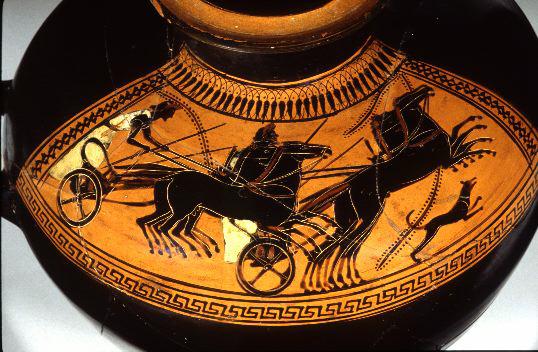The Olympic Games weren’t always as majestic as they are today. In our modern times, every four years the eager anticipation of once again witnessing the talent of nationally recognized athletes competing overshadows any other occurring events; that’s exactly how it was in ancient Greece. However, the purpose for the games has shifted over time. The first Olympic games made its mark in history in 776 B.C.E. Competition within ancient Greece was intended to demonstrate power and wealth to the Greek world. The human body was treasured for its physical capacity. As a result, competitive games often tested the endurance of the body. Festivals honoring the Greek gods were also a popular setting for hosting competitions. Although they were not yet named Olympic games, these competitions attracted crowds interested in moments of exhilaration in their otherwise ordinary lives. At that time, the games were a uniting hallmark of Greek culture and religion, a recognition of athleticism, as well as an indicator of Greek wealth and prowess that contributed to Greek self-identity.1

Religious festivals were celebrations honoring the Greeks’ gods and goddesses. The Greeks praised the gods; a way of doing so was by partaking in the funeral games, such as the one that Homer tells us about in his epic poem Iliad, where the hero Achilles holds such games in honor of his dead friend Patroclus.2 Today we attend funerals that are full of sorrow and sympathy, but the services the Greeks would host were filled with enjoyment and competition. They saw this as a way to honor and worship the gods, by acting in competitive games. Many of the athletic events eventually evolved into the Olympics. Chariot races of dashing horses, wrestling and boxing matches that were barbarous, foot races, discus throwing, archery, and spear throwing were the activities everyone put their time into at this festival.3
The Greeks believed that Zeus would favor some athletes and deny victory to others, so the athletes who were not denied saw this as empowering. The Greeks loved to be seen as worthy by the gods, so when Zeus would favor certain athletes, those competitors became evermore interested in the outcome of the games. The Nemean Games honoring Zeus was a huge festival the Greeks attended. One of the myths describing the origins of these games claims that they began as funeral games for prince Opheltes, who died as a baby in Nemea. During this festival, athletic and equestrian events were held. The Greek gods contributed to the start of the games. They were divinities that the people looked up to in a literal sense, since their home was thought to be at the top of Mount Olympus, “home of the gods and goddesses.” However, who was allowed into the games? Well, it turns out that if one weren’t Greek or if one spoke a different language, one was forbidden from entering or participating. Only free men were initially allowed to participate in games. Women were prohibited from engaging in or watching the games because the games tended to get severely brutal, and such brutality would scar the eyes of the women.4

In Homer’s portrayal of the funeral games for Patroclus, the hero Diomedes was the first to win the chariot race. He was rewarded with a slave woman and a cauldron. Prizes in the Olympics weren’t always like the ones Diomedes received, but they were ones that would make a Greek famous and rich.5 The winning athletes were presented with a wreath of olive leaves. Also, the city-state or polis for which they were representing gave the competitor a monetary award.6 But for equestrian events, the rider was never given the prize; it was given to the owner of the horse. The games in the Olympics were not quite the same ones we have today. The games in ancient Greece evolved into more challenging events. For example, the chariot races then had competitors racing while wearing armor; today, we no longer have this game. A popular competitive event today is volleyball, but it did not exist in the ancient Greek events. This is an example as to the changes that have been made over time.
Preparation for their exercises during training was a big deal to the instructors and to the athletes. The Anointer played a role in their training. He was the one who would smear oil on the athletes’ bodies in a certain circular technique; he kept the athletes’ bodies relaxed by doing this. Greeks would have to train for at least ten months before they would partake in their specific duels.7 One of the famous wrestlers, Milo, is an example as to how the athletes would train. Milo carried a calf over his shoulder every day, so the heavier the calf, the faster and stronger his body became. His training led him to win thirty-two wrestling competitions; to show that he was capable of doing this he had carried an ox on his shoulders through the Olympia stadium.8
One of the most important outcomes from the start of the Greek Olympic games was that every time they hosted them, all conflicts were put on hold between all Greek poleis or city-states. The competitions were a chance for the Greeks from different poleis to intermingle. The leaders from the different poleis went to support their athletes, but also to negotiate political disputes with the other leaders. This was called the Olympic truce, meaning that there was an agreement on making sure that there would be no warfare occurring during the games. This truce was made to maintain the focus on the games. The Greek religion was mainly about worshiping the mythological gods and goddesses, so the Olympics became a practice for the people in honoring their gods. Those who participated in the games were held at a high standard because they were representing their polis. In ancient Greece, the games gave the city-states the opportunity to come together and work out their conflicts face-to-face without warfare. In the modern era, we too strive for the same thing, for the Olympics to be a bridge between peoples and a place where political differences are set aside. But there have been many situations in the past that causes it to be troubling in this era.
- Salem Press Encyclopedia, January 2016, s.v. “Religion and Mythology in Ancient Greece,” by Judy Johnson. ↵
- Homer, Iliad (Boston: Houghton Mifflin & Company, 1881), 240-252. ↵
- Salem Press Encyclopedia, January 2015, s.v. “Olympic Games in the Ancient World,” by Thomas J. Sienkewicz. ↵
- Salem Press Encyclopedia, September 2016, s.v. “Sports and Entertainment in the Ancient World,” by Patrick Adcock. ↵
- Homer, Iliad (Boston: Houghton Mifflin & Company, 1881), 240-252. ↵
- Barbara Maussier, “The New Ethical Dimension of Sports Events: a Reflection on the Evolution from the Ancient Greek Olympic Sports Festival to Postmodern Sports Events,”Cultura, Ciencia y Deporte 12, no. 34 (January 2017): 21. ↵
- Salem Press Encyclopedia, September 2016, s.v. “Sports and Entertainment in the Ancient World,” by Patrick Adcock. ↵
- Encyclopaedia Britannica, June 2017, s.v. “Milo of Croton.” ↵



73 comments
Ruben Basaldu
This article was a very interesting read and I found very informative and intriguing. I can tell that there was a lot of research that went into this article because of how it is written and all the information that we are told. There were a lot of things that I never knew about the games during these times like that the games were a part of funeral games like that sounds so weird to me and that women couldn’t even watch the games.
Ruby Wynn
I enjoyed reading this article. I did not know that games were part of ancient Greek funerals. It is interesting that the Olympic games came from funeral games. I also found it interesting that you could only attend the Olympic games if you spoke Greek and were a Greek free man and that they thought that the games would scar a woman’s eyes.
Annissa Noblejas
It’s interesting to learn that women were forbidden from even watching the original games, on the count that they were too brutal for their eyes. I did not know that there was an Olympic Truce called between the city states during the games, but this must have provided a convenient platform for diplomatic discussions and possible negotiations while the focus was off of battle it’s self and directed towards individuals competing.
Madison Guerra
This article was very well written and I enjoyed it from beginning to end. It was very interesting to learn more about how the Olympics began so many years ago and to think about how much it has changed to current day. It is also very amazing that it is a tradition that is still going on after so long.
Lorenzo Rivera
This article was extremely interesting and well written. It helped me gain an entirely new insight on the Olympic games, and where they originated, as well as how they came to be in the first place. I have always loved the Olympics, and enjoyed watching them from the time I was a kid. They were made primarily in order to honor Greek Gods. Overall fantastic article, and extremely informative.
Harashang Gajjar
The ancient Olympic Games were a sporting event held every four years at the sacred site of Olympia, in the western Peloponnese, in honour of Zeus, the supreme god of Greek religion. Involving participants and spectators from all over Greece and even beyond, the Games were the most important cultural event in ancient Greece and were held from 776 BCE to 393 CE, a run of 293 consecutive Olympiads. So important were the Games in the ancient world that they were even used as a basis for the calendar.
Dylan Coons
I never knew about funeral games being held. I just though this Olympics were all about praising and honoring the gods. I personally never watch the Olympics because sweaty dudes running around isn’t my idea of entertainment, but learning more about the history and the origins of this event was interesting. Who would have thought that some ancient custom would be revived and still celebrated today?
Kathyleen Lauriano
I’ve always been a huge fan of the Olympics. Watching sports is all I do. Being an athlete of course you would be interested in the games. To being able to be victorious and praised for being the best. To be able to read how it all began is very interesting, I never knew where its origin came from. This article was very informative and a great read.
Robert Freise
The introduction of the Olympic games in Greece developed the organization and pride within countries that support their athletes. It started the movement in which people can honor their country be showing their athletic skills determined by their sport. It is truly amazing with so many different types of sports and each random set of skills these Olympians posses that ea ch person is unique on how they demonstrate and perform in the Olympic trails as well the Olympic games. This article gave me great insight on how the Olympic games started and how culturally it is very strong due to all of the different countries that participate.
Michael Hinojosa
Every time the olympics are on I make point to watch them because the whole concept of it all is just interesting and intriguing to me! But every time I’d turn the olympics on I never stopped to actually think about the origins of where this fantastic event came into the world, and knowing it actually came from the Greeks is definitely not the place I’d thought the Olympics would come from. Thanks for writing such an amazing article!